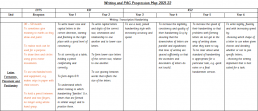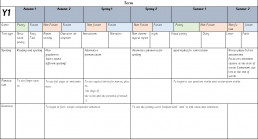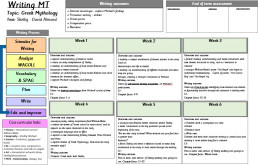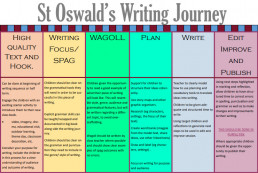Writing
Our Intent
National Curriculum Guidance
The programmes of study for writing at key stages 1 and 2 are constructed similarly to those for reading:
-
- Transcription (spelling and handwriting)
- Composition (articulating ideas and structuring them in speech and writing)
It is essential that teaching develops pupils’ competence in these 2 dimensions. In addition, pupils should be taught how to plan, revise and evaluate their writing. These aspects of writing have been incorporated into the programmes of study for composition.
Writing down ideas fluently depends on effective transcription: that is, on spelling quickly and accurately through knowing the relationship between sounds and letters (phonics) and understanding the morphology (word structure) and orthography (spelling structure) of words. Effective composition involves articulating and communicating ideas, and then organising them coherently for a reader. This requires clarity, awareness of the audience, purpose and context, and an increasingly wide knowledge of vocabulary and grammar. Writing also depends on fluent, legible and, eventually, speedy handwriting.
At St Oswalds we strive to inspire our children develop into articulate and imaginative writers, who are well-equipped with the basic skills to flourish into life-long learners. We aim to ensure all of our children develop a genuine love of spoken language and the written word through a text-based approach. In line with our reading strategy, we expose the children to a diverse range of genres, cultures and authors, with their independent writing mirroring this.
Careful links are made across the curriculum to ensure that children’s English learning is relevant and meaningful: where possible linking our reading, writing and the topic that we are covering in History and Geography. We aim to produce functional writers, who can meet the challenges of everyday literacy with confidence.
At St Oswald’s, our intent is to give our children the tools to become writers who can:
- Be confident writers: providing opportunities and tools that children need as writers to develop stamina for writing throughout school and be able to write at length.
- Ensure that all pupils know how to plan, practise, evaluate their work as well as carry out an effective edit and improvement process using feedback from the teacher.
Be independent writers: Building on a range of skills as they work through each journey of writing. - Children are challenged and encouraged to take risks and view mistakes as a positive part of the learning process.
All children, including SEND can access writing by providing the appropriate scaffolding, support and writing tools those children need in their writing process. - Children are challenged and encouraged to take risks and view mistakes as a positive part of the learning process.
- Be exposed to high quality texts: Children are exposed to high quality texts that model excellent writing practises across a broad range of genres.
- Be exposed to different text types: Children understand the purpose of a text type, intended impact of writing skills/tools and the ability to carefully select vocabulary with focus on the desired effect on the readers’ thoughts and feelings.
- Take pride in their work: Celebrate writing at each stage through the learning process to encourage children to take pride in their work.
- Children have high expectations of themselves where they take pride in all aspects of learning and in everything they produce.
Our Implementation
The key areas of implementation we use are:
- Planning documents
- Progression map
- Long Term Plan
- Medium Term plans
Flow Chart
The flow chart serves as an overview of how the subject is taught to ensure consistency in the following areas:
- Lesson structure
- Assessment
- Learning environment
- Resources
- Metacognitive scaffolding including knowledge organisers
- How we enhance the curriculum e.g. visits, celebrations, theme weeks
Impact
At St Oswald’s we see our children flourish through the wide-ranging curriculum to provide them with. We strive for the whole curriculum to be exciting, engaging and for all children to feel a sense of success.
In Writing, we aim for the impact to be:
- Children make good progress.
Children enjoy writing. They take pride in their pieces of extended writing. - Children’s writing improves dramatically across the course of the year as they follow the key objectives from the planning.
- Children reflect upon each piece of writing, and share it on Seesaw which allows them to take pride in their work and see where improvements could be made.
- Editing is a strength in our writing, with clear additions and revisions made in each piece of developed writing.




